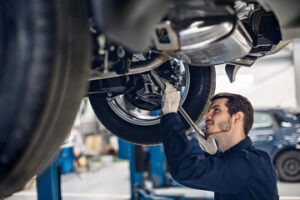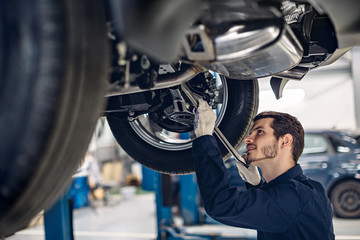Whether your vehicle’s check engine light has come on or you are experiencing other issues, you should bring it to a qualified auto repair shop. This will help ensure that your vehicle stays running properly and prevent larger problems from arising in the future.
Great repair professionals like auto repair will explain what they’re doing and why in terms you can understand. They should also keep you updated throughout the process.
Performing preventive maintenance on your vehicle can help you avoid expensive repairs and save time and money. It can also extend the life of your car and keep it in good resale condition. The most important thing to remember is to follow the recommended maintenance schedule for your particular model. Whether it’s an oil change, brake pad replacement, or windshield wiper replacement, following the manufacturer’s recommendations can help you avoid costly repairs and ensure that your car is safe to drive.
A preventive maintenance program helps reduce unplanned downtime, which costs the industry $22,000 every minute. By scheduling routine inspections, engineers can identify equipment issues before they break down, saving valuable production time and money. This type of management also reduces the risk of a complete breakdown, which is difficult to diagnose and can cost more than a repair.
There are several ways to implement a preventive maintenance strategy, depending on the needs of your organization. A time-based approach schedules a maintenance task at a specific interval, such as every 10 days. Another option is usage-based maintenance, which triggers a maintenance task based on an asset’s usage, such as after a certain number of kilometers or hours. Both approaches can be improved by using data analysis and leveraging the knowledge of staff members who use the equipment on a daily basis.
Even the best-maintained vehicles can experience unexpected problems, such as a broken brake, worn tires, or a faulty transmission. Putting off these repairs can lead to costly auto repair bills and may invalidate your warranty. The best way to avoid these problems is to stay on top of your maintenance schedule and take action when you feel a shudder, squeal, or vibration.
A well-documented preventive maintenance history can also make the process of repairing your car easier and faster. Keeping all of your maintenance records in one place can help you understand what repairs were done and why, making it easy to explain the problem to your mechanic. It’s also a good idea to get an itemized repair order, which includes the parts used and labor charges.
Getting a written estimate
Getting a written estimate for car repair is vital. Oral estimates are easily misheard and can lead to costly mistakes. A written estimate provides tangible proof that can be used to resolve any dispute. In addition, a written estimate will provide you with a clear breakdown of all charges. This will help you make an informed decision about the repairs that need to be done.
A written estimate is particularly important when dealing with insurance companies. Typically, the at-fault party’s insurance company will be responsible for covering the cost of having your vehicle repaired after an accident. The insurance company may send you a check for the amount specified in the estimate, or they might pay the shop directly to cover the costs of the repairs. In either case, it’s best to get a written estimate before you agree to have the work done.
The estimate should include a description of the specific repairs needed, including parts and labor costs. It should also include a statement that the estimated price won’t be exceeded without your consent. It’s also a good idea to ask about the shop’s policy on warranties. Some shops will offer a warranty on their work, while others will only honor the manufacturer’s warranty.
If you are unsure about the repairs that need to be made, you can always get a second opinion from another mechanic. A good mechanic will be able to explain the necessary repairs in simple terms and will help you understand why these repairs are so important. In addition, a good auto technician will keep complete records of all maintenance and repairs performed on your vehicle. This will help prevent unnecessary repairs in the future as well as ensure that your repairs are done correctly the first time.
If you are having an accident with your vehicle, it is crucial to take the time to get a written estimate before allowing the mechanic to begin work on it. It will give you peace of mind that you will not be overcharged for the necessary repairs. In some states, the law requires that auto repair shops provide written estimates before starting work on a vehicle.
Communicating with your mechanic
When you bring your vehicle in for repairs, it’s important to communicate with the mechanic. If you’re not able to clearly describe what’s going on with your car, the mechanic will have a hard time diagnosing it and providing a solution. It’s also important to ask questions and be respectful. Remember, your mechanic is just like your doctor; they’re there to help you with your car.
To ensure that your mechanic understands what you’re telling them, write down the symptoms you’re experiencing. This will save them diagnostic time and, ultimately, money. For example, if you’re having a problem with backfires or bottoming out when driving over uneven terrain, make sure to include this in your description. You should also mention when the problem started and how long it has been going on.
It’s also helpful to provide a clear description of the problem, including the noises, smells, and sensations it causes. This will help your mechanic diagnose the problem more quickly and make repairs faster. For example, “backfire” could mean a loud bang that occurs when the engine is revved, while “bottoming out” might be described as a harshness felt in the steering wheel or a loss of control.
Clear communication between you and your mechanic will also help you prevent misunderstandings and disputes over the cost of your repairs. For instance, you can request an itemized estimate of what will be done and how much it will cost. This will allow you to compare the price of parts versus labor. You can also ask your mechanic for more details about the quote, such as if it includes a warranty and where the parts are coming from.
It’s also worth asking your mechanic if they can work within a certain time frame. This will give them an idea of how urgent your repair is, which will help them schedule the job appropriately. Also, don’t forget to check out other shops’ prices before deciding on one. A good mechanic will do their best to stay competitive, but they will still need to take into account their own business overheads.
Choosing a shop
Choosing the right shop is vital for your auto repair needs. Besides finding out whether it has a business permit and whether its workers are qualified to carry out repairs, you should also make sure that the shop is certified by your local consumer protection agency. Also, you should find out how much it costs to use a particular part and how the labor charges are calculated. This will help you avoid a costly surprise after the repairs are completed.
You should also consider the shop’s appearance, amenities, and equipment. A clean, well-organized shop shows that the staff pays attention to detail and maintains high standards. Look for certifications, such as an Automotive Service Excellence seal, and ask about the technician’s experience and training. You can also ask about their knowledge of your specific vehicle’s model and systems. Finally, look for a warranty on the work.
When you choose a shop, it’s also important to know how long the repairs will take. This will allow you to plan ahead and get a rental car if necessary. Similarly, if your repair shop offers a shuttle service, this can help you save time and money.
A good mechanic will be honest with you about the condition of your vehicle, and he or she will recommend only the services that are required. You can also ask your friends and family for recommendations about local shops. It’s also helpful to find out about their reputations. If a shop has a bad reputation, you should avoid using it.
You can also check a shop’s reputation by looking at online reviews. Search “mechanics near me” or visit social media sites like Yelp to see what people have to say about the shop. You can also visit the shop’s website to learn more about it and its employees.
Another way to check a shop’s reputation is to visit the shop in person and speak with its managers and employees. You can ask questions about the shop’s services and price range, and you can even talk to a few different mechanics at the same time to compare their opinions.

